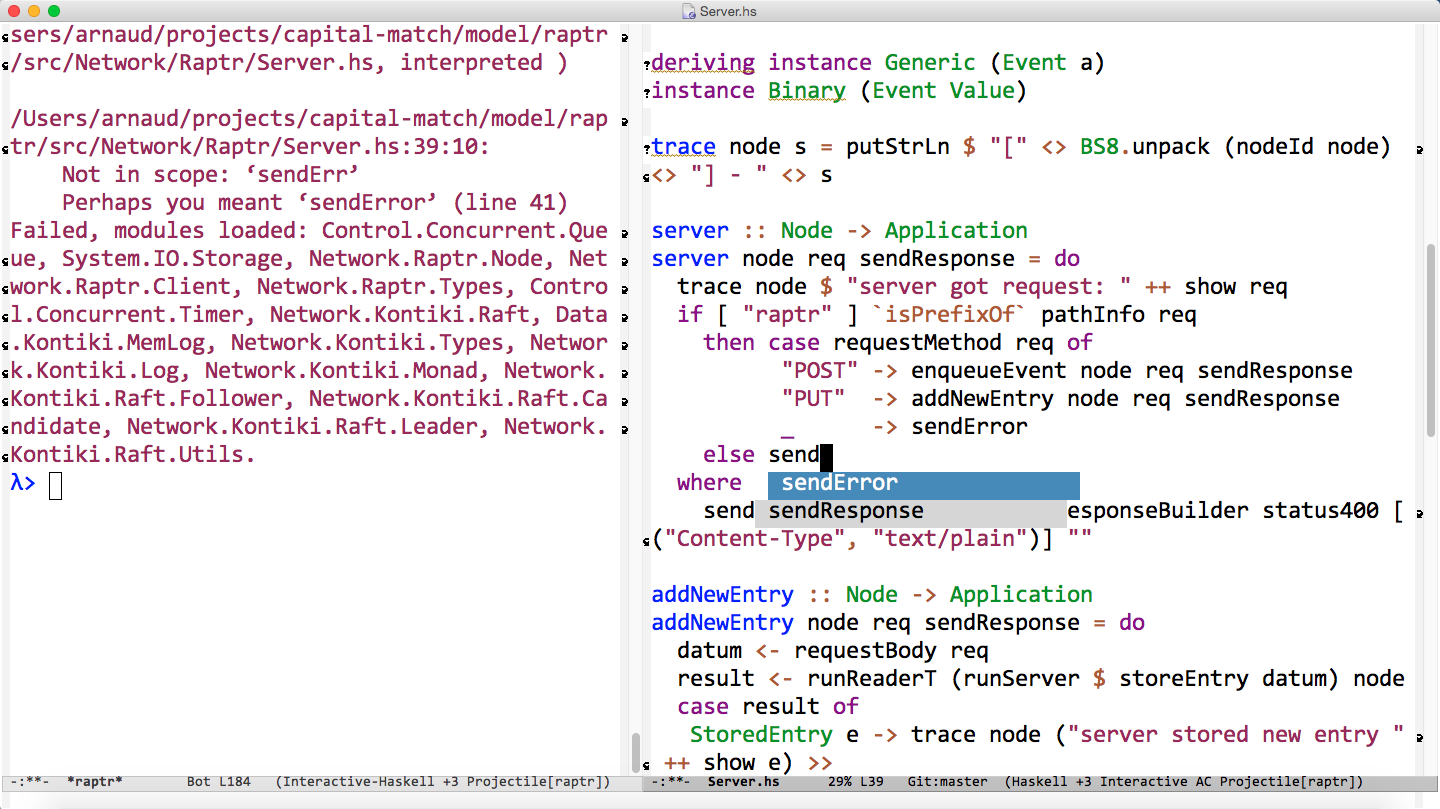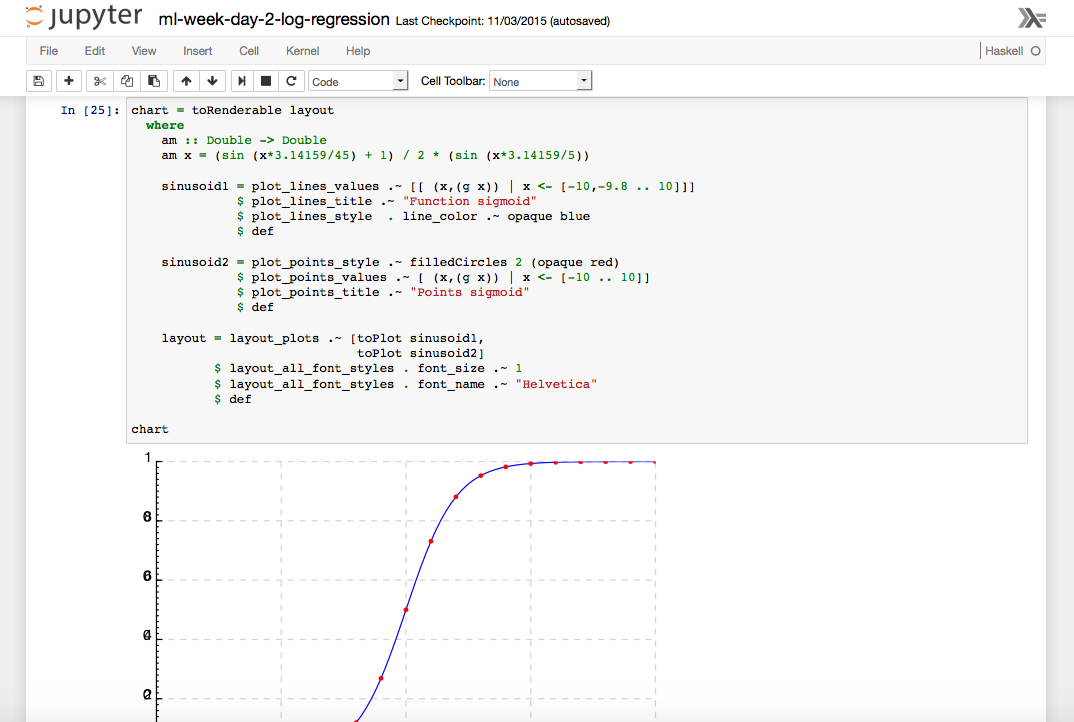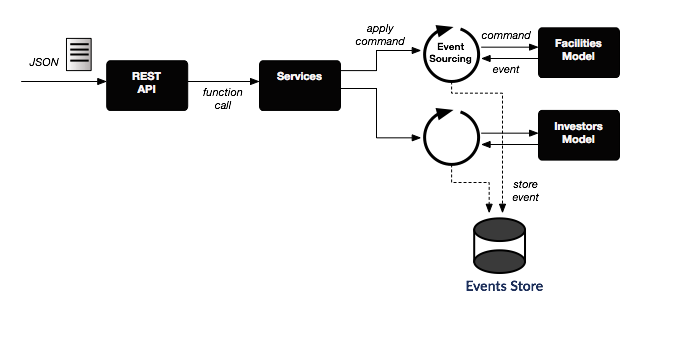The Real Real World of Haskell
Relations on the Land of Pure Functional Programming by a Mortal Being
Arnaud Bailly
2016-04-22
Table of Contents
- How I Came to Reside in the Land of Haskell and Why It Matters
- On Various Aspects of Haskelland Civilisation and The Mores of Its Inhabitants
- Some Ways this Wonderful Journey Could Inspire the Reader
How I Came to Visit Haskelland

Where the author dares to present himself

Where the author dares to present himself
- 20+ years of experience developing software…
- Has been coding in Haskell for side-projects since 2001
- Had the opportunity to join Capital Match as Co-founder and CTO in 2014
- Haskell was part of the plan since the beginning and the reason why I got involved
- I like theory but I prefere working software
On the Company which I travelled to Haskelland for

On the Company which I travelled to Haskelland for
- Capital Match is the leading plaform in Singapore for peer-to-peer lending to SMEs
- Backend system developed in Haskell, frontend in Clojurescript/Om since 2014
- Core Development team of 4 persons
Where it is demonstrated why the interest of the honorable reader might be aroused
- This is not a Haskell tutorial
- This is not a Monad tutorial
- Let’s stop thinking “Haskell is good for your brain but not for practical use”
- I will be happy if you end up thinking: I could try this cool stuff in my next microservice
- I will be even happier if you can put to actual use some of the stuff I present here
On Various Aspects of Haskelland

Where the author tries to cover the most important aspects of Haskeller’s civilisation in an extremely short span of time, thus probably missing lot of important points and generating frustration in the informed reader, but nevertheless hoping to convey enough tips for the audience to be willing to adopt some of the customs of those strange people.
Language
On some minor differences between Haskell Language and more Common ones

Haskell’s syntax favours terseness and strives to be close to mathematical language, compare:
with:
\(\{ (x, 2x) | x \in [1,100] \land x\ mod\ 3 = 0 \}\)
Haskellers don’t use lot of punctuation signs but favor using indentation to express nesting
On the importance of composition in Haskell

Haskell language is geared towards making composition of expressions straightforward
Referential transparency allows one to factorize all kind of common sub-expressions to remove redundancy
Partial application and composition of functions makes it easy to write function pipelines and build new functions out of old ones
On the virtue of being lazy

- Haskell’s evaluation semantics is lazy, non strict or call-by-need: Arguments to functions are evaluated only when needed
- This makes it practical to express infinite computations in the language
- This applies also to I/O operations which may not be evaluated hence have no side-effects if their result is not needed
On some of the less desirable aspects of the language

- No support for first-class module which makes large scale development more cumbersome
- A natural tendency to abuse operators and be too terse and dense too the point of becoming cryptic
- Beginners should expect to be confused at first by how the system supports strings and numbers
- Lazy I/O can have annoying side-effects
- There are too many ways to handler exceptions
Philosophy
On the importance of Types for Haskellers

- Haskellers seems to be extreme platonicists: Everything must have a well-defined type!
- Although types can be inferred by the compiler, they are an extremely important tool to design programs
- Haskell’s type system can be daunting at first but is conceptually elegant and compact
Where one discovers types do not impose extra burden at runtime
newtypes provide cheap encapsulation of other types as they are unpacked by compiler:One should never refrain from creating such new types, they provide more safety than type aliases
Where it is shown types can even conjure the undead
Phantom types provide type-level annotation to add more information to other types
Allow distinguishing between different types with identical representations
Provide thread-safety by ensuring some type variables do not escape local scope
Where one discovers subtle differences cause more trouble than obvious ones
Type classes can be thought as way to define interfaces, asbtracting away implementation details
Type classes can define not only functions, but values and types
Type classes actually define constraints on types that can be accumulated in expressions and checked by the compiler
Where one starts to wonder if there is an end to recursion
Type families provide type-level functions, e.g. ways to compute types from types at compilation time
Type families can be nested within
dataandclassdefinitions to provide contextual typesThey can also be used at toplevel:
Where it is shown how more constraints makes one more Free
data Gratis f a = Effectless a
| forall x. Effectful (f x) (x -> Gratis f a)
data EmailServiceF a where
DoMail :: Emailer -> Email -> EmailServiceF EmailStatus
GetAllEmails :: Confirmation -> EmailServiceF [EmailWithStatus]
type MailService = Gratis EmailServiceFliftFF :: EmailServiceF a -> MailService a
liftFF c = Effectful c pure
doMail :: Emailer -> Email -> MailService EmailStatus
doMail mailer mail = liftFF $ DoMail mailer mail
doGetAllEmails :: Confirmation -> MailService [ EmailWithStatus ]
doGetAllEmails = liftFF . GetAllEmailsinterpret :: MailService a -> ExceptT L.Text (WebStateM s l m) a
interpret (Effectful (DoMail mailer mail) f) =
lift (liftIO $ mailer mail >>= handleSendingResult) >>= interpret . f
interpret (Effectful (GetAllEmails confirmation) f) =
lift (runWithEmails $ doGetEmails confirmation) >>= interpret . f
interpret (Effectless a) = return aMores & Daily Life
Where the amazed foreigner discovers how much can be done with crude tools


- There is no one-stop Integrated Development Environment for Haskell: Best support is provided by integrating various extensions into Emacs
- There is a nice tutorial on how to setup emacs and Chris Done has provided some standard configuration
- Makes it easy to setup remote pairing
- Haskell for Mac is a recent initiative to provide an interactive and easy to use programming environment in Haskell
- Spacemacs provides a viable alternative with “everything” preconfigured and packaged
On the usefulness and efficiency of interacting with the machine

- Use the REPL, Luke! Provides much faster feedback loop than full-blown compilation and building, can be used for Type/Test-DD too
- GHC has a cool feature to handle holes: variables which are not in scope but typechecked so that one can use that to deduce needed type and implementation
- GHCi comes with a debugger but I have never used it: Debugging sucks, testing rocks
- IHaskell provides a Haskell kernel for IPython notebooks for interactive programming. Provides a nice alternative to text-only development in Haskell esp. for number crunching

On the typical day of a commoner in Haskell land
- Write a skeletal test file using hspec,
e.g.
test/FooTest.hs - Start REPL in Emacs by loading file
C-c C-l - See it fail to compile
:reload until it compiles- Run the test and see it fail:
hspec myTest - Fill in code until test passes
- Do a full compile and test run before pushing to CI
Government
Where we discover Haskellers also value experimentation

- There are quite a few testing frameworks available to write unit or integration tests
- I favour hspec which is one of the many rspec-inspired tools
- hs-webdriver provides bindings to Selenium in Haskell
- Running tests is automated as part of build tools, e.g. cabal
Where we see empiricism going hand in hand with formalism
QuickCheck is the property-based testing tool for Haskell
Use it for defining formal properties of your code beyond what type system provides
instance Arbitrary ScaleRatio where arbitrary = ... instance Arbitrary Transaction where arbitrary = ... prop_scaled_transaction_is_normalized :: Transaction -> ScaleRatio -> Bool prop_scaled_transaction_is_normalized tx (ScaleRatio ratio) = isNormalized tx' && isBalanced tx' where tx' = scale ratio tx
Where one discovers QuickCheck can be useful beside testing properties
Generating sample data to test migration
- Generate sample data sets to be used as part of other kind of tests: We used it to generate test data for schema migration code
sample_v8_Events :: [ByteString]
sample_v8_Events =
["{\"tag\":\"AddedDocuments\",\"contents\":[\"c1f09023b3a9398a1d8a257c372392ab\",[]]}"
, "{\"tag\":\"UpdatedInvestor\",\"contents\":{\"invDocuments\":[],
\"invBankAccount\":{\"bankBranch\":\"Ge\",\"bankAccountName\":\"1W\",\"bankAccountNo\":\"nN\",\"bankName\":\"AU\"},
\"invId\":\"46ed3336bc60a5a423962e9b6343c003\",\"invReferralCode\":{\"refer\":\"\"},\"invAccepttandcs\":false,
\"invLegalEntity\":{\"tag\":\"Corporate\",\"primaryContactPosition\":{\"tag\":\"OtherPosition\",\"contents\":\"jZ\"},\"primaryContact\":{\"personTitle\":\"Y8\",\"personFirstName\":\"qf\",\"personLastName\":\"pz\",\"personIdNumber\":\"yC\",\"personTelephone\":\"nC\",\"personEmail\":\"xwmRJAstJRrvBy1x8FnJ4Y2.6nmGy@opBpRq.sg\"},\"company\":{\"companyPostcode\":\"kT\",\"companyName\":\"-o\",\"companyUEN\":\"LA\",\"legalForm\":\"LTD\",\"companyAddress\":\"oh\"}}}}"
, "{\"tag\":\"NoEvent\",\"contents\":[]}"
, "{\"tag\":\"AddedDocuments\",\"contents\":[\"b9973afdd569f11269fe0be736086049\",[]]}"Generating execution sequences representing typical scenarios
genAdminActions =
frequency [ (1, return [])
, (1, do
f <- NewListing <$> arbitrary <*> newFacility <*> rate <*> risk
(f:) <$> genAdminActions)
, (10, (AcceptSomeFacility:) <$> genAdminActions)
, (5, (LookupFacilities:) <$> genAdminActions)
, (6, (AdvanceDay:) . (ConfirmRepayments:) <$> genAdminActions)
]- Monadic QuickCheck provides needed tooling to embed data generation within effectful code
On the use of different level of testing

Architecture
On the importance of laying out strong foundations

- GHC has become the standard compiler for Haskell, current version is 7.10.3
- It includes a lot of optimisations and features from 20 years of research on programming languages and compilation
- Always be sure to turn on
-Wall -Werrorwhen compiling: Warnings are often signs of potential troubles - Caveat: Compilation can take a
long time but still does not yet beat
scalac’s slowness
On the intricacies of building complex software with a Cabal of scholars

- Standard package management tool is Cabal which has become infamous due to cabal hell
- Cabal is not very good at managing complex package structures out-of-the-box
- stack greatly improves thing in order to provide fully reproducible builds and sandboxed environments, down to compiler versions
- nix provides a solution to package management in Haskell
Diplomacy
Where we separate that which is pure from that which is impure

- Type system provides a clean way to distinguish pure values from impure effects
- Staying pure has predictable semantics and opens the door to optimisations
- Effectful computations are one way portal to the real world
Where we learn we can have our cake and eat it too

- Concurrency in Haskell is mostly based on composable Software Transactional Memory operations
- STM do not mix with I/O operations hence cannot have observable side-effects but the upside is that runtime can detect deadlocks
- async a high-level library to package asynchronous computations within cheap Haskell threading model
- We used actor-like queues to protect access to I/O resources, e.g. database. Haskell provide a lot of useful abstractions on top of STM and core concurrency features to build your own tools
How Haskellers do communicate with the REST of the world

Where types make mortal beings doubt about their sanity
Newer services are now developed with Servant which provides a way to express APIs at the type level
type CreateJob = ReqBody '[JSON] Job :> Post '[JSON] JobId type ListJobs = Get '[JSON] [Job] type RemoveJob = Capture "jobid" JobId :> Delete '[JSON] JobId type SchedulerApi = "api" :> "scheduler" :> "jobs" :> CreateJob :<|> "api" :> "scheduler" :> "jobs" :> ListJobs :<|> "api" :> "scheduler" :> "jobs" :> RemoveJobMakes it possible to derive server, client or swagger specs from a single declaration
On some ways data is persisted to stable storage

- Haskell has bindings to most open-source or standard (R)DBMS but we did not used them
- Seems like perfect environment to use event sourcing
- We developed in-house solution to store events generated by the application as a sequential log of events stored in a file on disk

War
Where peaceful Haskellers prepare themselves to wage war

On the war-time organisation of Haskell’s legions

- propellor is a configuration management tool in Haskell developed by Joey Hess of Debian fame
- Configuration is expressed as a Haskell program that is compiled and run on the target host
- It provides a nice gpg key based model to encrypt private data (e.g. ssh keys, authentication tokens, passwords…) that need to be deployed in the source directory
- Once again, it allows expressing configuration items in a type-safe way
On the capabilities to wage war outside of Haskelland

- hdo is Haskell client for interacting with Digital Ocean’s API where we deploy all our containers
- There is thorough Haskell support for AWS API through Amazonka and Google’s APIs through gogol
- Monitoring is done through a riemann Haskell client
Conclusion
What benefits one can expect from visiting Haskelland

- Strong type discipline and powerful compiler removes a whole class of programming errors
- Types are also great to design complex software systems and yield great opportunities for verification and optimizations
- All the best practices you learnt are still valid in Haskelland, only a bit differently practiced
- You can stay away from “hairy” stuff while still being productive and have fun
What the cautious traveller should be aware of when ashoring Haskelland

- Development environment can be tricky to get - and stay - “right”
- A lot of the material one can find is research focused which can be daunting
- Avoid partial functions at all cost
- It can be hard to find Haskell developers locally
Acknowledgements
Credits
All the woodcuts illustrating this talk are drawn from the Encyclopédie de Diderot et d’Alembert with the exception of:
Thanks
- To the Devoxx selection committee for having accepted that talk,
- To all the fine people at Capital Match who made all this possible,
- To Haskellers all over the world who fuel the fire with their wits and spirit,
- To Haskell B. Curry who, among others, laid out the foundations for our daily job.